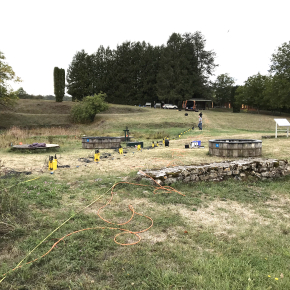1541504
Research Scientist in Interactive coupling of the Nitrogen cycle within the IPSL Earth System Model
Contexte
ESM2025 (http://esm2025.prod.lamp.cnrs.fr/) is an ambitious European project on Earth System Modelling. The project started on June 2021 and is funded by the European Commission’s H2020 programme for 4 years. ESM2025 relies on an international team from 19 European institutes composed of Earth system scientists and model developers, experts in model evaluation and feedback analysis, as well as specialists in climate education and science-policy dialogue. The project aims to develop the next generation of Earth System Models (ESMs). It will contribute to the production of an improved set of climate projections that will support European climate services and IPCC assessments, thus helping to better guide public action in the implementation of the Paris Agreement. One of the key objectives of the project is to better account for interactions and couplings between the components (land, ocean, atmosphere) within the Earth System Models, and in particular those related to the Nitrogen cycle.
The global nitrogen (N) cycle controls the abundance of nitrous oxide (N2O) and ammonia (NH3) in the atmosphere, which impact the anthropogenic radiative forcing of climate. Human production of reactive nitrogen (Nr) also impacts indirectly on terrestrial carbon productivity through Nr feedbacks from land and ocean to the atmosphere, which has major implications on natural carbon sinks and thus on atmospheric [CO2]. These feedbacks include interactions with the carbon cycle in the atmosphere, land, and ocean and thus affect the fate of anthropogenic carbon in all three components. In the framework of ESM2025, ESM existing modules with interactions between climate and the nitrogen cycle will be coupled to enable emission-driven climate simulations for N2O and to account for Earth system feedbacks.
Description
Interactive coupling of the nitrogen cycle will be done through two approaches: (1) Exchange of the gases N2O and NH3 between (a) ocean and atmosphere, and (b) land and atmosphere. (2) Transport of reactive nitrogen Nr through atmospheric deposition onto land and ocean surfaces and through lateral (riverine) input to the coastal ocean. Specific task consist in:
- Implementing new interactive couplings of the nitrogen cycle between model components of the IPSL Earth System Model, ensuring accurate treatment of N fluxes;
- Developing techniques to initialise and maintain stable pre-industrial conditions for interactive N-cycle simulations with IPSL ESM;
- Evaluate the performance of IPSL ESM in representing the N-cycle;
- Perform simulations with the model including the N-cycle in order to improve projections of future N2O and carbon sinks.
Home institution
Pierre Simon Laplace Institute (IPSL, https://www.ipsl.fr/) is a research cluster of nine institutes involved in climate change research. IPSL employs over 300 permanent researchers, 200 technical and administrative staff, and over 450 PhD students and postdoctoral researchers, spanning 30 nationalities. Their research mission is to contribute toward better understanding of the interactions between human activities in the Earth system, and the environment and climate dynamics at different timescales. The IPSL oversees the development of an Earth system model (IPSL-CM), which is one of the ESMs contributing to the IPCC Assessment Reports.
IPSL ESM2025 team
It includes experts in all three related components of the IPSL Earth System Model (ORCHIDEE, the land biogeochemistry component; PISCES, the ocean biogeochemistry component; and LMDZ-INCA, the component for the atmospheric transport; radiation and chemistry), in climate-GHG coupled modelling and computing scientists
How to apply ?
Applications should include (1) a curriculum vitae, (2) statement of motivation (no more than 1 page) and (3) names, addresses, phone numbers, and email addresses of at least two references. Please send your complete application as a single pdf file to Nicolas Vuichard (), Laurent Bopp () and Olivier Boucher ().
Compétences requises
Given the interdisciplinary nature of the research we are seeking highly motivated individuals with a degree (PhD or Master level) in for example mathematics, physics, engineering, computer science, meteorology or ecology. A broad interest in environmental sciences is essential. We are looking for candidates motivated by science with the ability to develop code and to integrate scientific knowledge into numerical models. Required skills are:
Programing (fortran) & Unix environment (shell commands / scripts)
Code management software (subversion)
Data processing (netcdf format)
Strong teamwork skills (communication & collaborative work)
English and/or French language






